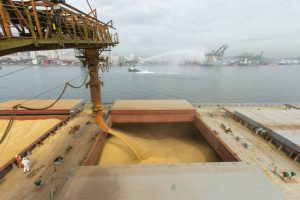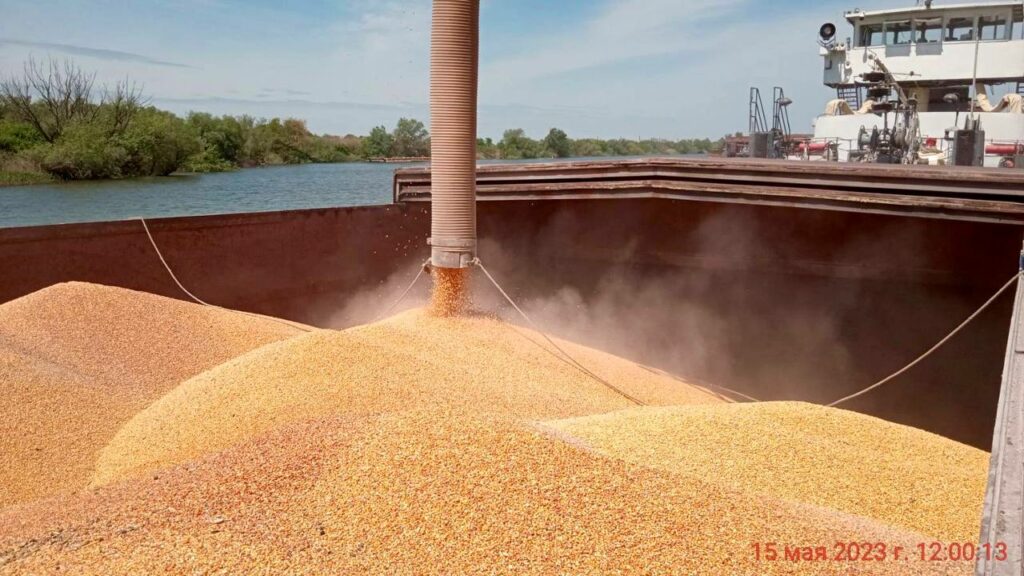“We propose to join forces”, – interview with Kateryna Morozova from EBA

Read about the Grain Agreement and the expansion of the cargo nomenclature, seaport concessions and new challenges during the war, as well as the problems of domestic business – read in the USM interview with the head of the South Ukrainian office of EBA Kateryna Morozova.
The European Business Association (EBA) was founded in 1999 with the support of the European Commission in Ukraine. The association is one of the largest and most influential business communities on the Ukrainian market. The organization establishes a dialogue between entrepreneurs and the authorities, promotes international cooperation, promotes Ukrainian exports, and, among other things, helps projects for the development and restoration of infrastructure and logistics.
EBA’s Southern Ukrainian office is headed by Kateryna Morozova. Under her leadership, the office covers the Odesa, Mykolaiv and Kherson regions, and therefore is engaged in business support in these regions.
Did the directions of the European Business Association change during the full-scale invasion? What are your priorities now?
The work priorities of the European Business Association have not changed, but have only expanded. Therefore, it remains relevant and important for us to support and protect the interests of transparent business operating in Ukraine, to be the mouthpiece of business in the country, to report to the authorities the issues/difficulties faced by companies, as well as the difficulties that arise in specific industries.
The war forced most companies to reconsider their interests, reassess the scale of work. Many were looking for ways to global markets – in order to develop in Ukraine. Therefore, at the end of last year, the Association launched its extra-territorial unit – Global Business for Ukraine. We all see how important it is to communicate information to the world, to global companies. And that is why we direct our main efforts to convey the current situation and mood of business, to help with the search for Ukrainian partners and stakeholders.
We all have to support our economic front today. Therefore, GB4U is working on attracting global business (which is not represented in Ukraine) to cooperate with Ukrainians. After all, in this way it is possible to promote investment in our country.
In addition, three months ago, in the context of investments, the European Business Association together with Global Business for Ukraine and Ukraine Invest launched the Investment Map of Ukraine’s regions. Currently, 117 investment projects have already been published on the Map – 55 from businesses (47%) and 62 from municipalities (53%). The total investment potential of all projects is about $1.8 billion. The most active regions are Kirovohrad (30 projects), Dnipropetrovsk (28 projects), and Odesa (20 projects) regions. In general, the projects represent 14 industries, including transport and logistics, agriculture, construction, food and processing industry, fuel and energy, etc.
Let me remind you that in 2022, the Committee for Business Security and Protection and the Committee for the Restoration of Ukraine began to work. Their creation was necessary, because during the war, security issues became too urgent, as well as the formation of a vision and active work in the reconstruction of the country in all its manifestations.
Tell us what projects related to port infrastructure are supported by the Association?
The European Business Association supports several such projects at once. In particular, we are currently working on a construction project on the lands of the water fund, which was developed jointly with the Ministry of Infrastructure of Ukraine. Its goal is to improve legislation in the field of construction. The project took into account the peculiarities of work within the seaport and its legal regime. It is also aimed at approving the procedure for allocating the lands of the water fund, which are occupied by the territorial sea, internal sea waters, including under the water area of sea ports.
In addition, EBA is in constant dialogue with Ukrzaliznytsia, in particular, regarding intermodal transportation. It is about the initiative of UZ to create an intermodal service. It could combine transportation by container trains and combined transport trains. Among the advantages are the rhythmicity of transportation, and its predicted time, and the predicted cost of transportation, the possibility of integration into the European system of container trains. We will work on this project in more detail.
Of course, we do not lose sight of the unblocking of the Black Sea ports of Ukraine for all types of cargo. After all, the blockade made inaccessible the markets to which we used to deliver everything by sea.
You call to open the sea ports of Ukraine. How do you assess this prospect now? How realistic is Mykolaiv Port to be included in the Grain Agreement?
This issue requires a lot of time and professional diplomacy. We focus not only on the full-fledged work of the “grain initiative”, but we want to achieve uniform conditions for all Ukrainian cargoes in the Azov-Black Sea basin. And, of course, the best option is to completely unblock commercial maritime transport and open the ports to all types of cargo.
As for the Mykolayiv region, local business is very much looking forward to the addition of the Mykolayiv port to the Grain Agreement. The association regularly appeals to the UN and Turkey, the Ministry of Foreign Affairs and the Minister of Infrastructure Oleksandr Kubrakov, offering to join forces in this direction. Ukraine needs a complete blockade of the Black Sea ports. And only through the unification of all involved departments and structures will it be possible to guarantee the safety and freedom of navigation – in accordance with the norms of modern international law.
Is it planned/discussed to expand the range of goods exported through the “grain corridor”? If so, what types of goods are we talking about?
During the last meeting of the Coordinating Council on Logistics in Agriculture, which was held with the participation of the business community of the EBA Logistics Committee, they were informed about the changes in agreements with neighboring countries. It was about products that are allowed for import and transit. There are also developments regarding plans for further negotiations with EU countries and institutions. However, the list of goods nomenclature is currently under negotiation.
How did the Association react to the decision to temporarily restrict the export of agricultural goods from Ukraine to/and through the territory of Poland, Hungary, Bulgaria and Slovakia? How is your policy formed regarding such decisions of the European Commission or state governments?
The association immediately appealed to the governments of Poland, Hungary, Bulgaria and Slovakia. We emphasized that their decisions complicate the operation of the grain corridor, create a threat to exports, which are extremely necessary to support the economy of our country, which is suffering from the aggression of the Russian Federation.
Moreover, such prohibitions are a direct violation of European legislation. Because many countries depend on our food exports, and due to such rash decisions, the food security of these countries is currently under question.
It is important that all import restriction measures are taken only in accordance with the Association Agreement and a separate EU regulation. So we expect that the situation will be resolved in the near future.
The association actively promotes the development of cooperation between Ukraine and the EU. Yes, we are inspired by European values. However, improving business in Ukraine is always a priority. Therefore, it is important to always be in dialogue with the authorities, so that they take into account the voices of entrepreneurs when making decisions.
The Verkhovna Rada is already considering draft law No. 6349 on environmental audit. The association is obviously dissatisfied with the project. What is the difference between the environmental inspections of the State Inspectorate and the new draft law?
Indeed, in Ukraine they want to expand the grounds for mandatory eco-auditing of companies. Draft law No. 6349 was supported by the VRU Committee on Environmental Policy and Nature Management as early as 2021.
At that time, the Association did not support this project. But on May 11, the Ecocommittee submitted the project for reconsideration. The Ministry of Environment has proposed its amendments, proposing to introduce a new form of environmental audit — a special ecoaudit, which will be conducted on objects that have been affected by Russian aggression or in the case of emergency situations. An eco-audit will help assess damage and losses. It can be voluntary or mandatory when the local authority decides to conduct such an audit at someone’s enterprise.
The audit is conducted by an eco-inspector who can take samples; non-governmental organizations can also be involved. That is, we see another attempt by the State Inspection Service to intervene in business operations. This will be virtually no different from environmental control measures. But during regular inspections (scheduled and unscheduled), the company has certain rights to protect its interests (for example, non-admission for justified reasons, the possibility of contesting the results).
And there is another difference – although there are no fines with the proposed eco-audit, as with eco-inspections, there is a conclusion with recommendations, the implementation of which is mandatory.
Does the draft law apply to the port industry? And what is the difference between auditing in the EU and in Ukraine?
Of course, the port industry will also feel these changes, because ports are the same legal entities.
Environmental audit in the EU is, first of all, a market tool that allows businesses to gain competitive advantages both among customers and among potential investors. In no case should an environmental audit be an element of regulatory policy, let alone an alternative to environmental audits to interfere with business operations.
Before the war, the Association actively participated in the concession of sea ports. At what stage are the concession projects now? Is the EBA accompanying them now? Are you involved in privatization projects of state ports?
The concession can significantly increase the investment attractiveness of Ukrainian ports. International experience shows that among many sources of financing, modernization and renewal of port infrastructure facilities, the concession is the most attractive tool for attracting funds.
Therefore, the Association supports concessions, but has never accompanied them. In particular, during the last meeting of the Logistics Committee with Yurii Vaskov, Deputy Minister of Infrastructure of Ukraine, the renewal of concession projects was discussed. We are talking about the port of Chornomorsk, as well as the creation of a special fund for the targeted use of port fees.
The first concession agreement was signed in pre-war times, in June 2020, between the State Enterprise “Administration of Sea Ports of Ukraine” and the association’s member company “Risoil S.A.” In addition, the EBRD, which is also a member company of the Association together with the International Finance Corporation, provided comprehensive support to the Ministry of Infrastructure in the preparation and holding of concession tenders in the Kherson and Olvia seaports.
Does the Association take care of Kherson? What is the current state of the port infrastructure there, how long can it take to restore it?
The South Ukrainian office of the Association includes companies from Odesa, Mykolaiv and Kherson. We try to unite entrepreneurs to be their mouthpiece. Of course, the situation in the region is not simple. And currently it is difficult to calculate specific time intervals for recovery. But we remain in contact with representatives of local authorities, to understand their assessment of the situation, the needs of the regions, “hot” projects for involvement – on the one hand. On the other hand, it is necessary to report problems from the business. And work together, because only together you can not only endure, but also Win.
During this year, we organized and held meetings with the authorities of the Kherson region, the business community had the opportunity to communicate with the Kherson and Mykolaiv regional prosecutor’s offices, as well as the Mykolaiv Regional Prosecutor’s Office.
Today, Mykolayiv Regional Military Administration works with donors not only to supply equipment, machinery, materials, food products, but also to restore critical infrastructure. There are some projects that are at the stage of implementation.
Also, the Kingdom of Denmark at the level of the Cabinet of Ministers agreed to support Mykolaiv Region in its reconstruction. In its turn, the Association is ready to provide comprehensive assistance, consulting and support, and also calls on the regional leadership to form large-scale projects, first of all, to restore critical infrastructure in order to receive donor aid.
In general, we can note that since the beginning of the full-scale war, the dialogue with the regional authorities has become more intense.
Also, it is worth noting that already on May 25, we will hold a meeting of the business community of EBA with Kherson Regional Military Administration in the context of regional restoration projects.
Certificate. Since 2008, Kateryna Morozova heads and works as the head of the Southern Ukrainian office of the European Business Association. From 2004 to 2008, she worked in the Department of International Relations of the Odesa National Law Academy





